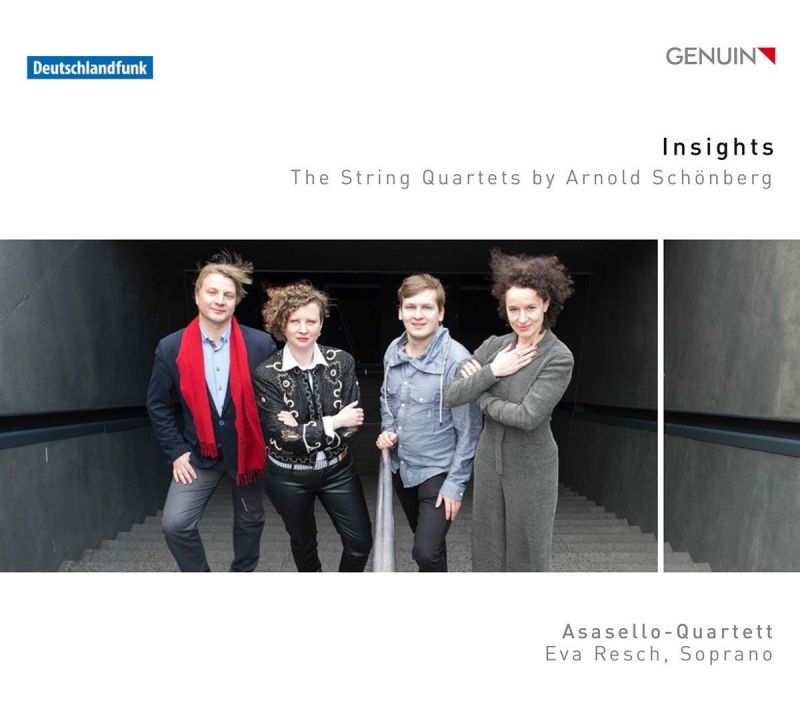SCHOENBERG String Quartets Nos 1 - 4
View record and artist detailsRecord and Artist Details
Composer or Director: Arnold Schoenberg
Genre:
Chamber
Label: Genuin
Magazine Review Date: 09/2016
Media Format: CD or Download
Media Runtime: 142
Mastering:
DDD
Catalogue Number: GEN16429

Tracks:
| Composition | Artist Credit |
|---|---|
| String Quartet No. 1 |
Arnold Schoenberg, Composer
Arnold Schoenberg, Composer Asasello Quartet |
| String Quartet No. 2 |
Arnold Schoenberg, Composer
Arnold Schoenberg, Composer Asasello Quartet Eva Resch, Soprano |
| String Quartet No. 3 |
Arnold Schoenberg, Composer
Arnold Schoenberg, Composer Asasello Quartet |
| String Quartet No. 4 |
Arnold Schoenberg, Composer
Arnold Schoenberg, Composer Asasello Quartet |
Author: Philip Clark
Quatuor Diotima pursued a canny middle course between Schoenberg as a modernist and as a composer earthed in late Romanticism. The Asasello Quartet generally enunciate with a drier tone and view even the First String Quartet as Schoenberg attempting to reach beyond the high Romanticism of Verklärte Nacht – the divorce from tonality secured in String Quartet No 2 (1907-08), the jittery night terror typical of Pierrot lunaire even, is already present in embryo in their perspective on this early score. As the booklet-notes explain, the Asasellos have modelled themselves consciously around the aesthetic of the LaSalle Quartet, and their indebtedness is clear.
The spider’s web of counterpoint that characterises the Third Quartet’s opening movement accrues with such apparent spontaneity that you might believe the music is creating itself in the moment. This is a carefully staged illusion, though: Schoenberg’s assiduously tiered dynamics and dovetailed phrases have all been observed to the letter. If the form of the Third Quartet tumbles into itself, the First explodes outwards and the Asasello Quartet’s performance meets the immensity of Schoenberg’s vision head on. Its 50-minute one-movement structure bends gymnastically around harmonic landmarks, and the Asasellos don’t hold back on the dramatic tension between harmonic instability and windows of still repose.
Their String Quartet No 2 penetrates deep into the poetic core of Schoenberg’s score: the wistful nostalgia of the opening movement bumping into the schizophrenic hysteria of the second – a resolution of sorts found only as the music heads for the foothills of uncertain atonality, a transition that throaty soprano Eva Resch handles with due harmonic diligence. String Quartet No 4 – generally the most problematic of the set – again benefits from the Asasello’s fastidious attention to detail of dynamic and articulation which helps keep Schoenberg’s boxy rhythmic contours alive.
No one who finds themselves in a whirl over Second Viennese School music should be without the Quatuor Diotima’s new box; but definitely it’s worth budgeting for the Asasello Quartet too. The recorded sound is fulgent and graphic, although for some tastes Teemu Myöhänen’s cello might be placed too prominently in the mix. But what playing!
Discover the world's largest classical music catalogue with Presto Music.

Gramophone Digital Club
- Digital Edition
- Digital Archive
- Reviews Database
- Full website access
From £8.75 / month
Subscribe
Gramophone Full Club
- Print Edition
- Digital Edition
- Digital Archive
- Reviews Database
- Full website access
From £11.00 / month
Subscribe
If you are a library, university or other organisation that would be interested in an institutional subscription to Gramophone please click here for further information.




